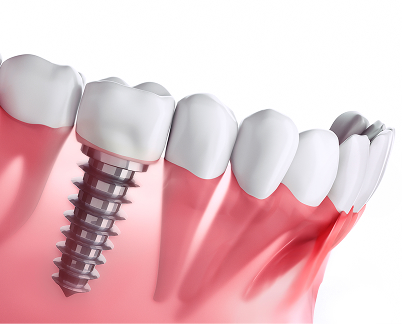
Full Mouth Rehabilitation with Implants – A Stable & Permanent Solution
A confident smile, comfortable bite, and lasting oral health are goals many of us cherish—but when multiple teeth are missing, failing, or compromised, achieving those goals can feel out of reach. That’s where full mouth rehabilitation with implants comes in: a comprehensive, durable solution that restores both function and aesthetics in a lasting way. At Gentle Care Family Dental, we understand the life-changing potential of this treatment, and here’s how it works and why it may be the ideal choice for you.
What Is Full Mouth Rehabilitation with Implants?
Full mouth rehabilitation (also called full arch reconstruction or full arch restoration) involves rebuilding or replacing most—or all—of a person’s upper and lower teeth using a combination of modern restorative techniques. When implants are central to the plan, we rely on implant-supported prostheses to serve as stable roots for new teeth.
Instead of removable dentures, implant-based rehabilitation offers fixed, secure restorations that function like natural teeth. In many cases, methods such as “All-on-X” place just four to six implants per arch, avoiding the need for one implant per missing tooth.
Why Choose Implants Over Traditional Options?
Stability & Comfort
Traditional dentures can slip, click, or shift — particularly while eating or speaking. Implant-supported restorations, by contrast, are firmly anchored in bone, giving you confidence and comfort in every bite.
Bone Preservation
When teeth are lost, the jawbone can gradually resorb (shrink) since it no longer receives stimulation from the tooth roots. Implants mimic natural roots, transmitting forces into bone and helping maintain bone integrity over time. This leads to better long-term facial structure and oral health.
Long-term Durability
With good care, implants are designed to last for decades—often a lifetime—while prosthetic teeth (crowns, bridges, or hybrid arches) may require periodic maintenance or replacement.
Simplified Care
Implant-supported teeth require daily brushing, flossing, and regular dental checkups—similar to natural teeth. They don’t need adhesives or overnight removal like dentures.
The Treatment Journey: What to Expect
1. Comprehensive Assessment & Planning
Your journey begins with a detailed evaluation—digital imaging (CBCT scans), examination of jawbone volume, gum health, occlusion (bite), and existing teeth. This helps us create a customized treatment plan tailored to your needs.
2. Preparatory Procedures (if needed)
To set the stage for successful implants, some patients may need preparatory surgeries:
- Extractions of failing or decayed teeth
- Bone grafting or sinus lifts when bone volume is insufficient
- Soft tissue treatments to ensure healthy gums
Depending on the case, we may use minimal grafting or staged approaches to reduce invasive steps.
3. Implant Placement
Once the site is ready, titanium implants are placed into the jawbone. In many full arch cases, implants are strategically angled to maximize bone support and avoid anatomical structures. These implants act as anchors for the new prosthetic teeth.
You might receive temporary restorations during the healing period so you’re never without teeth.
4. Healing & Osseointegration
Over several months (often 3–6 months), the bone gradually fuses to the implant surface—a process called osseointegration. This biological union is essential for the strength and long-term success of the implants.
5. Final Prosthesis Delivery
Once osseointegration is complete, we place the abutments and deliver the final fixed prosthetic arch—custom-crafted to match your ideal aesthetic, bite, and function.
6. Maintenance & Follow-Up
Long-term success depends on regular hygiene visits, radiographic monitoring, and diligent oral care to protect against complications like gum disease or peri-implantitis.
Who Is a Good Candidate?
Full mouth implant rehabilitation is often suited for individuals who:
- Have multiple failing or missing teeth across one or both arches
- Are tired of unstable dentures
- Seek a permanent, fixed solution rather than removable prostheses
- Possess—or are willing to undergo procedures to acquire—adequate bone volume
- Maintain good general health (healing ability, no uncontrolled systemic conditions)
- Practice good oral hygiene and commit to regular dental follow-up
Even patients with severe bone loss or advanced periodontal disease may still be rehabilitated using grafting, staged implants, or hybrid techniques.
Real-World Evidence & Success Stories
Clinical literature has documented successful full mouth reconstructions using implant-supported prostheses even in challenging cases, such as severe bone loss or periodontitis, demonstrating stable results over long-term follow-up.
One study showed that early implant placement (within weeks of extractions) with minimal grafting can yield favorable outcomes when primary stability is achieved.
Another review emphasizes improved patient satisfaction, chewing ability, and quality of life following full-mouth implant rehabilitation.
Risks, Challenges & How to Mitigate Them
Like any major dental procedure, full-mouth implant rehabilitation carries potential risks:
- Infection around implants (peri-implantitis)
- Bone loss or implant failure if integration fails
- Delayed healing or complications in medically compromised patients
- Prosthetic wear or mechanical complications over time
However, by working with a skilled implant team, selecting appropriate implant systems and designs, ensuring good planning and hygiene, and maintaining long-term follow-up, many of these issues can be minimized or prevented.
Why Gentle Care Family Dental Is the Right Partner
At Gentle Care Family Dental, we care deeply about restoring your smile with precision, compassion, and lasting results. Our approach includes:
- Careful, personalized treatment planning
- Use of advanced imaging and digital workflows
- Gentle surgical techniques and patient comfort
- Comprehensive follow-up and maintenance
- A commitment to restoring both form and function
If you’re seeking a stable, permanent solution to restore your full smile and reclaim your oral health, full mouth rehabilitation with implants could be the transformation you’ve been waiting for. Let us guide you to your best smile yet.


